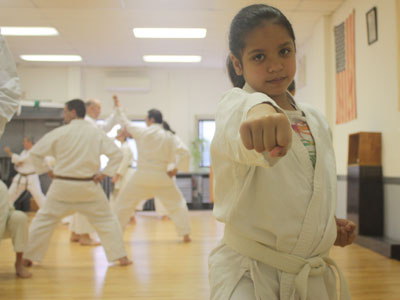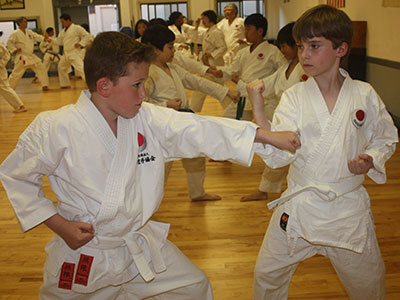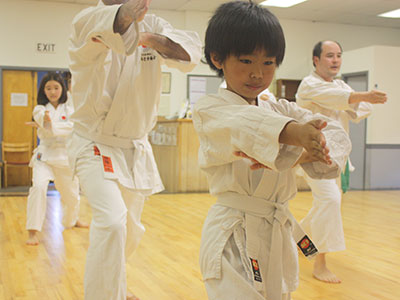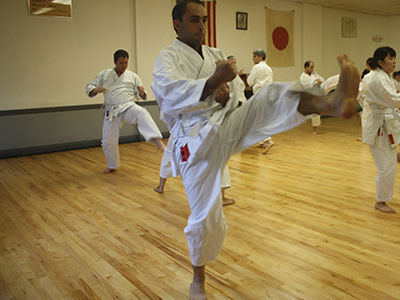A new Beginner Class usually starts the first Tuesday of each month, January to November. There is no Beginner Class in December.
Children must be at least 6 years old. For children 7 years old or younger, at least one parent or guardian must participate in the Beginner Class with the child.
For class times, see the Schedule page. Please arrive 15 minutes before your first class to allow time to register and pay. You do not need to register in advance.
The Beginner Class is a one-month program. Beginning students should plan to attend twice a week while they are taking the Beginner Class.
Typical Curriculum
| Tuesday | Thursday | |
|---|---|---|
| WEEK 1 | Class 1 Draw hand, punch, front kick, down block, front stance, hip rotation, reverse punch, step in punch |
Class 2 Rising block, outside block inside block |
| WEEK 2 | Class 3 Side-snap kick, side-thrust kick, kibadachi, roundhouse kick |
Class 4 Step forward and back in front stance, back stance, knife-hand block |
| WEEK 3 | Class 5 Basic sparring |
Class 6 Back-fist strike, hammer-fist strike, elbow strike, knife-hand strike, back kick |
| WEEK 4 | Class 7 Kata |
Class 8 Combination basics, full review |
After one month, most students of the Beginner Class are ready to start attending the intermediate class. However, if you miss practice several times, you may need to repeat the Beginner Class for a second month. Children may also benefit from repeating the Beginner Class.
Please see the Membership Fees Page.
Beginners should wear loose-fitting, body-concealing clothing, such as sweats. When you join the Intermediate class, you will be asked to buy a karate uniform (keiko-gi).
Karate training is good for the entire family. Compared to most sports, karate is something that parents and children can do together, while also developing their physical and mental strength.
If you have experience in another martial art, you may want to take the beginner class. Techniques can be very different among the martial arts, even among different styles of karate.
If you have experience in Shotokan Karate, please consult Sensei Toryu on whether you should take the beginner class. Important factors are whether you remember the kata and whether you are in shape to handle the aerobic and strength-oriented drills.
There can be large variations among different martial arts schools. Even within a single style, such as Shotokan Karate, classes may be taught differently depending on the teacher and organization. We recommend that you watch a class, especially a beginner class, before you participate. Also, talk to people who train there or who know the school and its instructor.
One advantage of JKA Boston is its affiliation with the Japan Karate Association World Federation and Shotokan Karate-Do International. These organizations ensure karate is practiced at the same high standards throughout the world.



